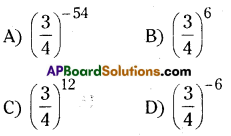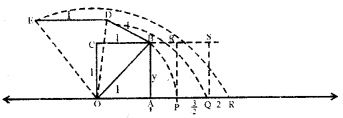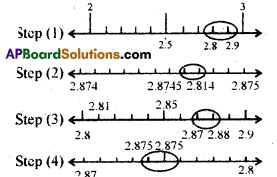Practice the AP 9th Class Maths Bits with Answers Chapter 1 Real Numbers on a regular basis so that you can attempt exams with utmost confidence.
AP State Syllabus 9th Class Maths Bits 1st Lesson Real Numbers with Answers
Choose the correct answer :
Question 1.
A rational number equivalent to \(\frac{-3}{4}\) is
A) \(\frac { -4 }{ 3 }\)
B) \(\frac { -4}{ 5 }\)
C) \(\frac { 3 }{ 4 }\)
D) \(\frac { -6 }{ 8 }\)
Answer:
D) \(\frac { -6 }{ 8 }\)
![]()
Question 2.
\(\frac { -2 }{ 3 }\) lies on …………. on the number line.
A) right side of the zero
B) left side of the zero
C) zero
D) can’t be determined
Answer:
B) left side of the zero
Question 3.
Which of the following is false?
A) Every rational number is a natural number
B) Every rational number is a whole number
C) Every rational number is an integer
D) Every integer is a rational number
Answer:
D) Every integer is a rational number
Question 4.
A rational number between 5 and 6 is
A) \(\frac { 9 }{ 2 }\)
B) \(\frac { 10}{ 2 }\)
C) \(\frac { 11 }{ 2 }\)
D) \(\frac { 12 }{ 2 }\)
Answer:
C) \(\frac { 11 }{ 2 }\)
Question 5.
\(\mathbf{0 . \overline { 3 }}\) …………….
A) \(\frac { 3 }{ 8 }\)
B) \(\frac { 2}{ 9 }\)
C) \(\frac { 3 }{ 7 }\)
D) \(\frac { 1 }{ 3 }\)
Answer:
D) \(\frac { 1 }{ 3 }\)
Question 6.
The decimal form of \(\frac { 1 }{ 18 }\) ix
A) \(0.0 \overline{5}\)
B) \(0 . \overline{05}\)
C) \(0 . \overline{5}\)
D) 0.06
Answer:
A) \(0.0 \overline{5}\)
![]()
Question 7.
1.25 in \(\frac{\mathbf{p}}{\mathbf{q}}\) form
A) \(\frac { 4 }{ 5 }\)
B) \(\frac { 5}{ 4 }\)
C) \(\frac { 5 }{ 6 }\)
D) \(\frac { 6 }{ 5 }\)
Answer:
B) \(\frac { 5}{ 4 }\)
Question 8.
If a and b are any two rational num¬bers then a rational number between
a and b is
A) a + 1
B) b -1
C) \(\frac{a+b}{2}\)
D) a . b
Answer:
C) \(\frac{a+b}{2}\)
Question 9.
If n is a natural number other than a perfect square then \(\sqrt{n}\) is number.
A) rational
B) irrational
C) natural
D) none
Answer:
B) irrational
Question 10.
If ‘x’ is an irrational number then x + 2 is ………………….. number.
A) natural
B) rational
C) irrational
D) can’t be determined
Answer:
C) irrational
Question 11.
If ‘x’ is an irrational number then x – 3 is …………. number.
A) rational
B) natural
C) irrational
D) complex
Answer:
C) irrational
Question 12.
Number which can’t be expressed in p/q form are………… numbers.
A) irrational
B) rational
C) whole
D) natural
Answer:
A) irrational
![]()
Question 13.
The combination of Q and S given the set of ……………. numbers.
A) natural
B) integers
C) whole
D) real
Answer:
D) real
Question 14.
(2 + \(\sqrt{2}\) )(2 – \(\sqrt{2}\)) is a……………. number.
A) irrational
B) rational
C) can’t be determined
D) none
Answer:
C) can’t be determined
Question 15.
\(\sqrt{\frac{a}{b}}\)

Answer:
(C)
Question 16.
\((\sqrt{\mathbf{a}}+\mathbf{b})(\sqrt{\mathbf{a}}-\mathbf{b})=\)
A) a2 – b2
B) a – b
C) a2 – b
D) a – b2
Answer:
D) a – b2
Question 17.
\((\sqrt{\mathbf{a}}+\mathbf{b})(\sqrt{\mathbf{a}}-\mathbf{b})\) =
A) 10
B) \(7+2 \sqrt{10}\)
C)\(7-2 \sqrt{10}\)
D) \(2 \sqrt{10}\)
Answer:
B) \(7+2 \sqrt{10}\)
Question 18.
\((\mathbf{7}+\sqrt{2})(\mathbf{7}-\sqrt{\mathbf{2}})=\)
A) 45
B) 5
C) 3
D) 47
Answer:
D) 47
Question 19.
The rationalising factor of \(\frac{1}{5 \sqrt{2}}\) is

Answer:
(C)
![]()
Question 20.
The rationalising factor of \(\frac{1}{\sqrt{27}}\) is
A) \(\frac{1}{\sqrt{27}}\)
B) \(\sqrt{27}\)
C) \(\sqrt{3}\)
D) 3
Answer:
C) \(\sqrt{3}\)
Question 21.
\(\left(\frac{3}{4}\right)^{-3} \times\left(\frac{3}{4}\right)^{3} \times\left(\frac{3}{4}\right)^{6}=\ldots \ldots\)

Answer:
(B)
Question 22.
\(\sqrt[5]{32}\) =
A) 325
B) 2
C) 4\(\sqrt{2}\)
D) 2\(\sqrt{2}\)
Answer:
B) 2
Question 23.
(128)1/7 =
A) 2
B) 4
C) 8
D) \(8 \sqrt{2}\)
Answer:
A) 2
Question 24.
Radical form of 271/5 is
A) \(\sqrt{27}\)
B) \(3 \sqrt{27}\)
C) \(4\sqrt{27}\)
D) \(5\sqrt{27}\)
Answer:
D) \(5\sqrt{27}\)
Question 25.
a1/n =
A) \(\sqrt[n]{a}\)
B) \(\frac{\mathrm{a}}{\mathrm{n}}\)
C) na
D) n + a
Answer:
A) \(\sqrt[n]{a}\)
Question 26.
The Rationalising factor of \(\frac{1}{5-\sqrt{3}}\) is
A) \(5+\sqrt{3}\)
B) \(\sqrt{3}-5\)
C) \(\frac{1}{5+\sqrt{3}}\)
D) \(\frac{1}{\sqrt{3}-5}\)
Answer:
C) \(\frac{1}{5+\sqrt{3}}\)
Question 27.
\(\sqrt[n]{a^{m}}\) =
A) am/n
B) an/m
C) amn
D)am-n
Answer:
A) am/n
![]()
Question 28.
If x3 = 10, then x is
A) a rational number
B) an irrational number
C) a perfect number
D) an even number
Answer:
B) an irrational number
Question 29.
If p3 = 216, then p is
A) an odd nuipber
B) an irrational number
C) a perfect number
D) a rational number
Answer:
D) a rational number
Question 30.
The radical form of 152/3 is
A) \(\sqrt[3]{30}\)
B) \(\sqrt[3]{15}\)
C) \(\sqrt[3]{225}\)
D) \(\sqrt[3]{45}\)
Answer:
C) \(\sqrt[3]{225}\)
Question 31.
The radical form of 62/3 is
A) \(\sqrt[3]{36}\)
B) \(\sqrt{36}\)
C) \(\sqrt{48}\)
D) \(\sqrt{216}\)
Answer:
A) \(\sqrt[3]{36}\)
Question 32.
The exponential form of \(\sqrt[4]{81}\) is
A) 91/4
B) 92/4
C) 31/4
D) 31/8
Answer:
B) 92/4
Question 33.
The exponential form of \(\sqrt[35]{105}\) is
A) 31/35
B) 51/35
C) 71/35
D) 1051/35
Answer:
D) 1051/35
Question 34.
\((\sqrt{\mathbf{a}}+\mathbf{b})(\sqrt{\mathbf{a}}-\mathbf{b})=\)
A) a2 – b2
B) a – b2
C) a – b
D) a + b2
Answer:
B) a – b2
Question 35.
\((\sqrt{x}+y)^{2}=\)
A) x + y + 2\(\sqrt{xy}\)
B) \(\sqrt{x}\) + y2 + 2xy
C) x + y2 + 2 \(\sqrt{x}\) .y
D) x2 + y2 + 2 \(\sqrt{x}\) .y
Answer:
C) x + y2 + 2 \(\sqrt{x}\) .y
Question 36.
\((\sqrt{3}+\sqrt{2})(\sqrt{3}-\sqrt{2})=\)
A) 1
B) 0
C) 5
D) 13
Answer:
A) 1
![]()
Question 37.
(- 8)7/5 x (- 8)-4/5 x (- 8)-3/5 =
A) 0
B) – 8
C) 1
D) – 512
Answer:
C) 1
Question 38.
The decimal form of \(\mathbf{0 . \overline { 3 2 }}\) is
A) \(\frac{32}{100}\)
B) \(\frac{32}{99}\)
C) \(\frac{32}{90}\)
D) \(\frac{32}{50}\)
Answer:
B) \(\frac{32}{99}\)
Question 39.
\(\sqrt{9} \times \sqrt{16}=\)
A) \(\sqrt{25}\)
B) \(\frac{3}{4}\)
C) 12
D) 144
Answer:
C) 12
Question 40.
\(\sqrt{a} \div \sqrt{b}=\)
A) \(\sqrt{a b}\)
B) \(a \sqrt{b}\)
C) \(\sqrt{a b}\)
D) \(\sqrt{\frac{a}{b}}\)
Answer:
D) \(\sqrt{\frac{a}{b}}\)
Question 41.
\(\left(\frac{-2}{3}\right)^{2 / 7} \times\left(\frac{-2}{3}\right)^{5 / 7}=\)
A)1
B) \(\frac{-2}{3}\)
C) 0
D) \(\left(\frac{-2}{3}\right)^{2 / 5}\)
Answer:
B) \(\frac{-2}{3}\)
Question 42.
If \(\sqrt{3}\) = 1732, then \(\sqrt{27}\) =
A) 3 x 1.732
B) 9 x 1.732
C) 27 x 1.732
D) 6 x 1.732
Answer:
A) 3 x 1.732
Question 43.
Whose value is 11.18 if \(\sqrt{5}\) = 2.236 ?
A) \(\sqrt{25}\)
B) \(\sqrt{75}\)
C) \(\sqrt{125}\)
D) \(\sqrt{250}\)
Answer:
C) \(\sqrt{125}\)
Question 44.
The decimal value of \(\frac{\mathbf{2 2}}{\mathbf{7}}\) is
A) 3.421
B) 3.142
C) 3.412
D) 3.124
Answer:
B) 3.142
Question 45.
If \(\sqrt{10}\) = 3.162, then \(\sqrt{40}\) = mi i
A) 6.324
B) 9.486
C) 12.648
D) 31.62
Answer:
A) 6.324
Question 46.
\(\sqrt[5]{32^{-2}}=\)
A) 2
B) 4
C) 6
D) 1/2
Answer:
B) 4
Question 47.
Rationalising factor of \(\sqrt{5}+\sqrt{6}\) is
A) \(\sqrt{5}\) – 6
B) 5 – \(\sqrt{6}\)
C) \(\sqrt{5}-\sqrt{6}\)
D) 5 + \(\sqrt{6}\)
Answer:
C) \(\sqrt{5}-\sqrt{6}\)
Question 48.
Express 3.25 in the form of p/q
A) \(\frac { 13 }{ 4 }\)
B) \(\frac { 65 }{ 2 }\)
C) \(\frac { 13 }{ 40 }\)
D) \(\frac { 13 }{ 20 }\)
Answer:
A) \(\frac { 13 }{ 4 }\)
![]()
Question 49.
If an = b, then \(\sqrt[n]{b}\) =
A) n
B) a
C) b1/n
D) a1/n
Answer:
B) a
Question 50.
\(\frac{3^{1 / 5}}{3^{1 / 3}}=\)
A) 31/15
B) 32/15
C) 3-2/15
D) 38/15
Answer:
C) 3-2/15
Question 51.
The collection of negative numbers and whole numbers is denoted by
A) Q
B) W
C) Z or l
D) N
Answer:
C) Z or l
Question 52.
The rational number which lies be¬tween two rational numbers a and b is
A) a—b
B) b—a
C) \(\sqrt{a b}\)
D) \(\frac{a+b}{2}\)
Answer:
D) \(\frac{a+b}{2}\)
Question 53
2/3 =
A) \(0 . \overline{6}\)
B) 0.66
C) 0.666
D) 0.6
Answer:
A) \(0 . \overline{6}\)
Question 54.
The decimal value of \(\frac{1}{2^{3}}\) is
A) 0.5
B) 0.25
C) 0.125
D) 1.125
Answer:
C) 0.125
Question 55.
π is
A) a naturaF number
B) an irrational number
C) a rational number
D) none of these
Answer:
B) an irrational number
Question 56.
\(\sqrt{7}\) = 2.65 (approximately), then the approximate value of \(\sqrt{28}\) is
A) 2.65
B) 5.3
C) 7.95
D) 10.6
Answer:
B) 5.3
![]()
Question 57.
Cube root of \(\sqrt{4}+\sqrt{36}\) is
A) \(\sqrt[3]{144}\)
B) 8
C) 2
D) \(\sqrt[3]{40}\)
Answer:
C) 2
![]()
Question 58.
Value of \(\sqrt[4]{81}+\sqrt[5]{32}\) is
A) 5
B) 9
C) – 1
D) A or C
Answer:
A) 5
Instructions: Observe the number line and give answer from Q. No. 6-10.
In the number line at ‘O’ draw a unit square OABC with each side 1 unit in length and OB = OP, OD = OQ, OE = OR.

Observe above number line and answer the following:
Question 59.
The length of \(\overline{\mathrm{OP}}\) is
A) \(\frac{3}{2}\)Units
B) \(\sqrt{2}\) Units
C) \(\sqrt{3}\) Units
D) 1 Unit
Answer:
B) \(\sqrt{2}\) Units
Question 60.
The length of \(\overline{\mathrm{AQ}}\) is
A) \(\sqrt{3}\) – 1 Units
B) \(\sqrt{3}\) + \(\sqrt{2}\) Units
C) \(\sqrt{3}\) – \(\sqrt{3}\) Units
D) \(\sqrt{3}\) + 1 Units
Answer:
A) \(\sqrt{3}\) – 1 Units
Question 61.
Perimeter of the rectangle OCSQ
A) 2(\(\sqrt{3}\) + 1) Units
B) 6 Units
C) 2(\(\sqrt{2}\) + \(\sqrt{3}\)) Units
D) 2(\(\sqrt{2}\) + 1) Units
Answer:
B) 6 Units
Question 62.
Area of rectangle PQRS in sq. units
A) \(\sqrt{3}\) – 1
B) \(\sqrt{3}\) + \(\sqrt{2}\)
C) \(\sqrt{3}\) – \(\sqrt{2}\)
D) \(\sqrt{2}\) – 1
Answer:
C) \(\sqrt{3}\) – \(\sqrt{2}\)
Question 63.
\(\sqrt{5}\) lie between
A) 1 and 2
B) 2 and 3
C) 3 and 4
D) 0 and 1
Answer:
B) 2 and 3
![]()
Question 64.
A Rectangular park dimensions are (3 + \(\sqrt{2}\)) and (2 + \(\sqrt{2}\)) units, then the area of that park in square unit.
A) 8 + 5\(\sqrt{2}\)
B) 5 + 2\(\sqrt{2}\)
C) 13\(\sqrt{2}\)
D) 5 + \(\sqrt{2}\)
Answer:
A) 8 + 5\(\sqrt{2}\)
Question 65.
The value of 1.999 ……………… in the form of \(\frac{\mathbf{p}}{\mathbf{q}}\) (p,q are integers, q ≠ 0 )
A) \(\frac{1999}{1000}\)
B) 2
C) \(\frac{1}{9}\)
D) \(\frac{19}{10}\)
Question 66.
Observe the successive magnification of 2.8746 on the number line.

Arrange these steps orderly.
A) 1,3, 4, 2
B) 3, 4, 2,1
C) 3, 4, 1, 2
D) 1, 2, 4, 3
Answer:
A) 1,3, 4, 2
Question 67.
If ‘x’ is a positive real number and x2 = 2, then the value of x3 is
A) 2\(\sqrt{2}\)
B)3\(\sqrt{2}\)
C) 4
D) \(\sqrt{2}\)
Answer:
A) 2\(\sqrt{2}\)
Question 68.
If \(\sqrt{10}\) = 3.162, then the value of \(\frac{1}{\sqrt{10}}\) is
A) 31.62
B) 3.162
C) 0.3162
D) 316.2
Answer:
C) 0.3162
Question 69.
If x = \(\frac{\sqrt{3}+\sqrt{2}}{\sqrt{3}-\sqrt{2}}\) and y = \(\frac{\sqrt{3}-\sqrt{2}}{\sqrt{3}+\sqrt{2}}\) then the value of x + y is
A) 5
B) 5 + 2\(\sqrt{6}\)
C) 10
D) 5 – 2\(\sqrt{6}\)
Answer:
C) 10
Question 70.
If x = 2 + 7\(\sqrt{3}\) , then the value of x – \(\frac{1}{x}\) is
A) 4
B) \(\sqrt{3}\).
C) 2 \(\sqrt{3}\).
D) 2 + \(\sqrt{3}\).
Answer:
B) \(\sqrt{3}\).
Question 71.
A rational number equivalent to \(\frac{5}{7}\) is
A) \(\frac { 15 }{ 17 }\)
B) \(\frac { 25 }{ 27 }\)
C) \(\frac { 10 }{ 14 }\)
D) \(\frac { 10 }{ 27 }\)
Answer:
C) \(\frac { 10 }{ 14 }\)
Question 72.
If x = \(\sqrt{5}\) + 2, then the value of x – \(\frac{1}{x}\) is
A) 2\(\sqrt{5}\)
B) 4
C) -4
D) -2\(\sqrt{5}\)
![]()
Question 73.
The value of \(\left(\frac{1}{2}\right)^{3}+\left(\frac{1}{3}\right)^{3}-\left(\frac{5}{6}\right)^{3}\) is
A) \(\frac { 5 }{ 6 }\)
B) \(\frac { 5 }{ 12 }\)
C) \(\frac { -5 }{ 36 }\)
D) \(\frac { -5 }{ 12 }\)
Answer:
D) \(\frac { -5 }{ 12 }\)
Question 74.
If the length and breadth of a rectangular sheet are \(\sqrt{5}\) + \(\sqrt{2}\) and \(\sqrt{5}\) – \(\sqrt{2}\) units, then it’s area in sq. units
A) \(\sqrt{3}\)
B) 2\(\sqrt{5}\)
C) 3
D) 7
Answer:
C) 3
Question 75.
Ail irrational number between 4 and 5
A) \(\sqrt{20}\)
B) \(\sqrt{9}\)
C) \(\sqrt{4.5}\)
D) 4.5
Answer:
A) \(\sqrt{20}\)
Question 76.
Rationalizing Factor of 3\(\sqrt{9}\)
A) \(\sqrt[3]{3}\)
B) \(\sqrt[3]{6}\)
C) \(\sqrt[3]{9}\)
D) \(\sqrt[3]{27}\)
Answer:
A) \(\sqrt[3]{3}\)
Question 77.
There are three odd numbers and one even number. What type of number is their sum ?
A) Even number
B) Neither even nor odd number
C) Cannot be determined as actual numbers are not given
D) Odd number.
Answer:
D) Odd number.
Question 78.
\(\sqrt[5]{32^{2}}\) = …………..
A) 1
B) 2
C) 4
D) 5
Answer:
C) 4
Question 79.
The product of first 2019 whole numbers……
A) 0
B) 2019
C) 1.2.3.4 …………..2018.2019
D) 1 + 2 + 3 + ………………+ 2019
Answer:
A) 0
Question 80.
Express 3.25 in the form of \(\frac{\mathbf{p}}{\mathbf{q}}\).
A) \(\frac{13}{4}\)
B) \(\frac{65}{2}\)
C) \(\frac{13}{40}\)
D) \(\frac{13}{20}\)
Answer:
A) \(\frac{13}{4}\)
Question 81.
Radical form of \(3^{\frac{1}{5}}\) is
A) \(\sqrt[5]{3^{1}}\)
B) \(\sqrt[3]{5^{1}}\)
C) \(\sqrt[5]{1^{3}}\)
D) \(\sqrt[3]{1^{5}}\)
Answer:
A) \(\sqrt[5]{3^{1}}\)
![]()
Question 82.
Which of the following is the \(\frac{\mathbf{p}}{\mathbf{q}}\) form of 3.72 ? (q ≠ 0 and p and q are coprimes)
A) \(\frac{372}{100}\)
B) \(\frac{31}{5}\)
C) \(\frac{93}{25}\)
D) \(\frac{93}{5}\)
Answer:
A) \(\sqrt[5]{3^{1}}\)
Question 83.
Which of the following rational numbers lies between 2 and 3 ?
A) \(\frac{2}{3}\)
B) \(\frac{3}{2}\)
C) \(\frac{5}{2}\)
D) \(\frac{5}{3}\)
Answer:
C) \(\frac{5}{2}\)
Question 84.
1.121231234………….. is not a rational number because it is
A) Recurring Decimal
B) Non terminating Decimal
C) Non recurring Decimal
D) Both B and C
Answer:
D) Both B and C
Question 85.
The exponential form of \(\sqrt[5]{3^{2}}\) is
A) \(3^{5 / 2}\)
B) \(3^{2 / 5}\)
C) \(3^{5 /times 2}\)
D) \(3^{5 – 2}\)
Answer:
B) \(3^{2 / 5}\)
Question 86.
The square root of which number is a rational number ?
A) 14
B) 80
C) 1.96
D) 0.004
Answer:
C) 1.96
Question 87.
The value of “P” on the given number line.
![]()
A) \(\frac{-7}{5}\)
B) \(-\frac{5}{7}\)
C) \(\frac{7}{5}\)
D) \(\frac{5}{7}\)
Answer:
A) \(\frac{-7}{5}\)